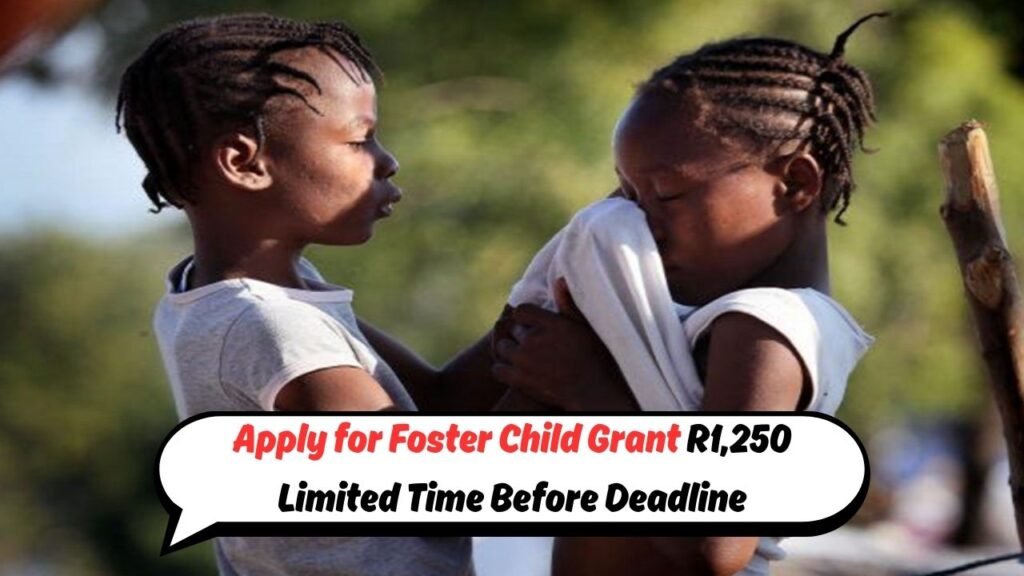R1,250 Foster Child Grant: The South African government offers significant support to families and guardians caring for foster children through the R1,250 Foster Child Grant. This financial aid is designed to ensure that foster children have access to essential resources and a nurturing environment. The grant plays a crucial role in alleviating the financial burden on foster families, allowing them to focus on providing the best care possible. If you are a foster parent or considering becoming one, understanding the application process and eligibility criteria for the Foster Child Grant is essential to ensuring you receive the support you need to make a difference in the lives of these children.

Understanding the R1,250 Foster Child Grant Application Process
Applying for the R1,250 Foster Child Grant can be a straightforward process if you are well-prepared. The first step is to gather all necessary documents, which typically include the foster child’s birth certificate, court order placing the child in your care, and your South African ID. It’s also important to have proof of your residency and income status, as these are often required to process the application. Once you have all the documents ready, you must visit your nearest South African Social Security Agency (SASSA) office. Here, you will fill out the necessary forms and submit your application. It’s advisable to inquire about any additional documents that might be needed, depending on your specific circumstances. The SASSA officials are generally helpful and can guide you through the process, ensuring that you complete all the required steps. After submission, it may take some time for the application to be processed, so patience is key.
Eligibility Criteria for the Foster Child Grant
Eligibility for the R1,250 Foster Child Grant is primarily determined by a few key factors. First and foremost, you must have a valid court order that places the child in your foster care. This legal document is crucial as it verifies your guardianship and is non-negotiable in the application process. Additionally, both you and the foster child must be residents of South Africa. The grant is specifically aimed at supporting South African citizens, permanent residents, or refugees, ensuring that the aid reaches those who truly need it within the country. Another consideration is the age of the foster child, as the grant typically covers children up to 18 years of age. However, there are exceptions for children who are still in school, and in such cases, the grant can be extended until the age of 21. It’s also important to note that the grant is not means-tested, meaning your income level does not affect your eligibility, which is a significant relief for many foster families.
Benefits of Receiving the Foster Child Grant
The R1,250 Foster Child Grant provides numerous benefits that go beyond mere financial support. For foster families, receiving this grant means being able to cater to the child’s basic needs, such as food, clothing, and educational expenses. This financial assistance ensures that foster children have access to a stable and supportive environment, which is crucial for their emotional and physical development. Moreover, the grant allows foster parents to invest in extracurricular activities, healthcare, and other essential services that contribute to a well-rounded upbringing. The grant also offers peace of mind to foster parents, knowing that they have a dedicated source of support to help manage the responsibilities that come with caring for a foster child. By alleviating some of the financial strain, the grant enables foster parents to focus more on providing emotional support and nurturing the child’s growth and development.
How the Foster Child Grant Impacts South African Society
The R1,250 Foster Child Grant plays a significant role in supporting South African society by providing essential aid to foster families. This grant helps to ensure that vulnerable children have access to the care and resources they need to thrive. By supporting foster parents financially, the grant encourages more individuals to open their homes to foster children, thereby increasing the number of safe and loving environments available for these children. Additionally, fostering a child contributes positively to society by reducing the burden on orphanages and state care facilities, allowing them to focus on helping more children in need. The grant also fosters a sense of community, as it brings awareness to the needs of foster children and encourages others to consider fostering. In this way, the Foster Child Grant not only benefits individual families but also strengthens the social fabric of South Africa, promoting a culture of care and responsibility towards children in need.




